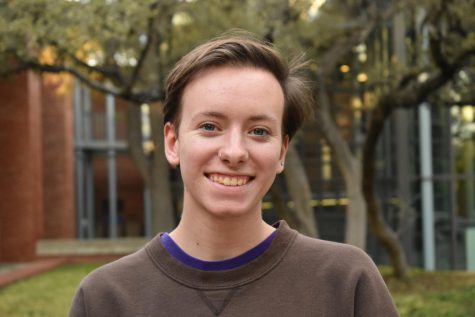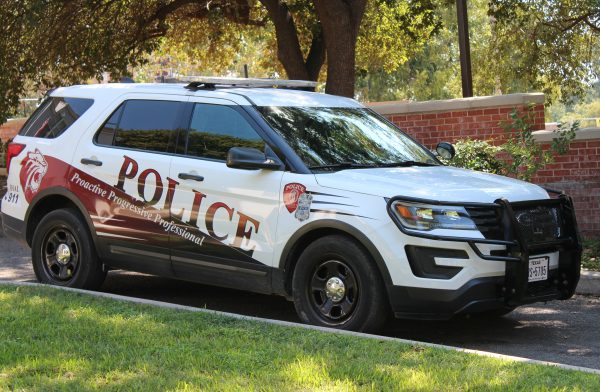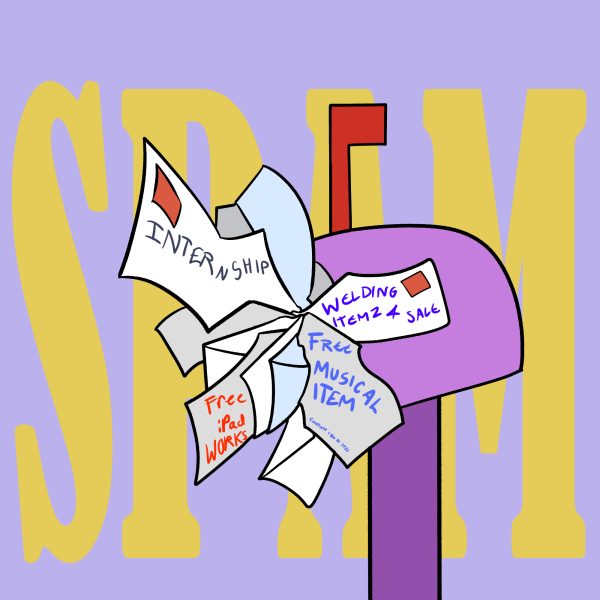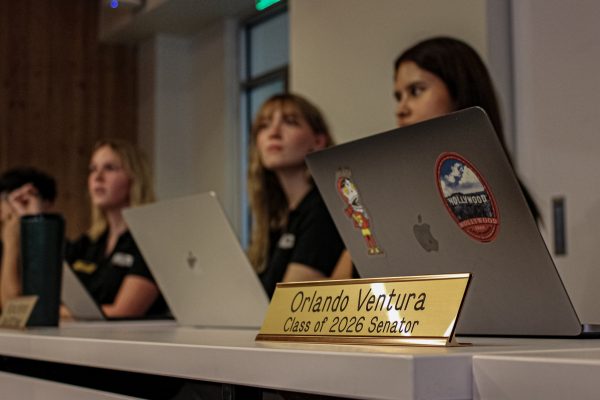Previously on SGA: Updates on Thomas rats, TU dining and TUPD
The following covers the meeting on March 30
Climate check
Junior Senator Donya Ahmadi began climate check with feedback from Prassel residents that an external door is failing to close. They have reported sightings of adults walking into the building who are not a part of the Trinity community. President Oliver Chapin-Eiserloh, senior, advised talking to Facilities Services to see if there is a hardware issue.
First-year Senator Harrison Tinker brought up a problem addressed at a previous SGA meeting: Some McLean residents reported their rooms being cleaned improperly or skipped entirely on scheduled cleaning days. At least three different suites said their bathrooms were cleaned but the main floor was avoided, despite it being clear. First-year Senator Ani Siva, a resident of McLean, corroborated Tinker’s concern. President Chapin-Eiserloh said he will follow up with Facilities Services on this issue.
Junior Senator Indigo Pearson reported that there is still mold in vents throughout Prassel. A student informed him that someone from Facilities Services put a trash bag over their vent to see what got collected. The student allegedly ran a mold test which came back with black mold. President Chapin-Eiserloh asked who from Trinity was working with them on this problem, and Senator Pearson said he would reach out and clarify.
Senator Pearson also reported that Dining with the Director was a success on March 29, with Charles Robles, Food Services Director, wanting more opportunities to field ideas from students. There will be a box at the front of Mabee Dining Hall where students can drop recipes or ideas for food they want, as well as launch a portal for suggestions for Revolve restaurants. Robles hopes to have a four-week cycle of restaurants instead of the current two-week cycle.
In other Mabee news, the seals for the ice cream machine have arrived and are working properly. However, according to Senator Pearson, the Freon has reversed and is now heating up the ice cream. The machine will be fixed next week.
In other news from Dining with the Director, Senator Pearson said Skyline will be reopened next fall at the beginning of the year.
Sophomore Senator Danny Nguyen reported that Trinity is beginning a process to select a new dining provider. The first part of this includes student focus groups, and he is going to be part of one. He will continue to update SGA with information that is not confidential.
Sophomore Senator Danae Barkocy said she is still receiving complaints from residents of Thomas about rats in the building. They are finding items that have been chewed through along with other evidence of rodents. President Chapin-Eiserloh recommended she reach out to Bret Biance, Director of Residential Life, to figure out the best channels to report the issue since it has been ongoing.
TUPD update
Trinity University Police Department (TUPD) Chief Paul Chapa and Assistant Chief John Rowse joined SGA to talk about campus safety and clarify their role on campus.
Chapa has been in law enforcement for 31 years, all in higher education. On Trinity’s campus, he said, TUPD focuses on teaching moments instead of having a punitive approach when addressing issues involving students. TUPD enforces Texas and federal laws on campus, but the goal is not to create a criminal record for students when they violate a law. Instead, they ensure that they can exercise the campus judicial process internally and treat it as a learning opportunity.
According to Chapa, Trinity’s campus, while open to the community, is a safe environment. However, because it’s in a large metropolitan area surrounded by million-dollar homes and an interstate, students should be aware of their surroundings. He said outside individuals do occasionally walk through residence halls by tailgating students who hold the door open for them.
Chapa said there has been an increase in calls about homeless individuals on campus because there is a tent camp set up on the opposite side of 281. He has walked through to talk to them, clarifying that Trinity is private property they should avoid. If students see someone on campus that seems suspicious, Chapa recommends calling TUPD so they can assess the situation and identify how to help that individual.
Senior Senator Samuel Grimsley asked how TUPD balances punitive measures with being understanding, and Chapa said it depends on the case. For example, students sometimes smoke marijuana on campus, despite the fact that possession is illegal in Texas. If they found a student in violation of this law, they would take the marijuana into evidence and forward the case to the student judicial process instead of arresting them. However, if it was an aggravated case including money and weapons, they would likely go to jail.
Communications Chair Rebecca Wicker asked what effects turnover in TUPD has on the force. Chapa said that there is a national problem of turnover and problems recruiting new officers. He said the climate around police is critical right now because of “bad apples” that are highlighted in national news. In addition to this, the risk of the job, as well as pay and health benefits creates a difficult situation for local police departments when trying to keep a full staff.
Chapa reminded SGA that TUPD’s former Assistant Chief was arrested in the fall, which was disappointing for him after thinking he knew his coworker after so long. TUPD recovered from this change internally because of the strong base of public servants on the force, Chapa said. They have recently hired a number of new officers and had a swearing-in ceremony last week.
Rowse added that TUPD is a small department that doesn’t get a lot of crime action, which isn’t what all police officers want. TUPD gets a lot of newer officers that often move onto bigger departments or better jobs after a few years.
Senator Grimsley then asked about the process for TUPD entering university residences. Chapa clarified that by the Fourth Amendment, TUPD does not have the right to walk in a dorm room unless consent is given or they have a valid search warrant. Residential Life employees can also let them in without either of these things due to stipulations in the residence agreements that allow Residential Life to do health and wellness checks at any time.
Senator Pearson asked what the procedure is for finding students in public on campus after having too much to drink. Rowse said TUPD’s number one priority is ensuring the students’ safety. If they would not be safe alone in a dorm room, TUPD might get them to the “drunk tank,” a sobering unit staffed by licensed nurses who check blood alcohol levels and monitor people’s wellness. Students taken there are given a card with information explaining the process of how they got there and how they will make it back to campus, and TUPD officers also try to explain it to a friend who is not intoxicated. In extreme cases, TUPD will call EMS to assess the situation.
Senator Pearson asked if students have the ability to say no to going to a sobering unit. According to Rowse, TUPD will ask students questions to gauge their state of mind, but sometimes students are able to express an unwillingness to go to the drunk tank. However, TUPD has the authority to take them there anyway, even though they try to avoid this as much as possible.
Chapa clarified that the goal with intoxicated students is to make sure they are safe and later recognize the consequences of public intoxication. With the drunk tank, individuals leave with no criminal record or charges, just a generated report explaining what happened.
Senator Barkocy asked if only Trinity students are taken to the sobering unit or if it’s open to the public. Rowse said that anyone in the city of San Antonio can end up at the drunk tank, including vagrants, students and even businessmen. It’s a diversion to not have to take people to jail for public intoxication.
Rowse then mentioned body cams, which all TUPD officers wear. Anytime they make contact with anyone, the camera turns on. They record every single incident, and the recordings are kept for 45 days unless manually stored for 180 days or forever.
Senator Tinker asked how many officers are currently employed by TUPD and if they have a target.
In total, Chapa said there are 24 to 25 TUPD employees, including dispatch officers, on-shift officers and those working investigations. On-shift officers, Rowse explained, are the TUPD officers who work one of the three shifts on campus: 5 a.m.-1 p.m., 1-9 p.m. or overnight. Officers rotate every three months and there are four people on each shift.
Senator Nguyen shifted the conversation to City Vista and the potential for break-ins. With the reopening, he wondered if there were any new security upgrades, infrastructure or plans for more of a police presence. According to Chapa, there are cameras in the City Vista parking garages. There is a higher risk of burglary there because it’s on the side of a large thoroughfare with a dimly lit road in the back end of the garage. There are gates that keep the parking lot secured, but there are still opportunities for criminal activity.
There have been four car burglaries in the past three weeks at City Vista during construction, and in recent cases, the cars were unlocked. Chapa and Rowse recommend locking personal vehicles and removing any valuables from them.
Senator Tinker asked who watches the surveillance camera footage on campus. Rowse said there are several monitors in the dispatch office that display the most high risk areas, like City Vista. Depending on recent activity, the dispatch officers will set the monitors up to focus on hot spots. However, they also take phone calls and dispatch officers, so there isn’t constant active surveillance by an officer.
Senator Tinker then asked if the cameras are equipped with any motion detection. Chapa explained that at night, since there’s very little motion, the cameras shut down except when something moves. They are also equipped with license plate readers in case local police are looking for one specific plate in the area.
Wondering about TUPD’s relationship with other universities, Senator Tinker asked if there have been any situations arising where officers respond to emergencies outside of campus. Chapa said TUPD has a mutual agreement with San Antonio Police Department (SAPD) and the Bexar County Sheriff’s Office, for example, which allows TUPD to monitor those radio channels and communicate. The dispatch officer can hop onto SAPD dispatch radio or the San Antonio Fire Department. These connections are important to have, according to Chapa, in case there are fires, mass casualty events, active shooters, etc., because SAPD have resources like SWAT and special ops which TUPD does not.
Senator Tinker asked about the last time a TUPD officer responded to a situation off-campus, to which Chapa answered that there hasn’t been one. While TUPD’s jurisdiction is on campus and the 1000 feet around it, as Texas Peace Officers, they have the obligation to engage if they see a felony in progress elsewhere. Otherwise, TUPD doesn’t chase SAPD calls. One TUPD officer was recently dispatched to translate between English and Spanish during a traffic stop in Olmos Park, but that was it.
Senator Grimsley brought up the critical climate surrounding police officers due to racial injustice and the conversation about police brutality. He asked if there were any new or longstanding efforts TUPD is making to combat racial bias in their work. Chapa said TUPD has always practiced transparency and support for fellow men and women. Through crisis intervention training and community outreach, Chapa said he feels like TUPD has always placed the importance of respecting one another at the top of their list. While controversy can make it difficult to wear a badge with pride, Chapa said officers have the ability to make an impact in community policing on a college campus.
Treasurer Adam Rinaldi, senior, asked if the drone policy on campus has changed. According to Chapa, flying drones is prohibited on campus right now. It is already illegal to fly a drone within five miles of an airport, but the specific reasoning behind the on campus ban is in case the pilot loses control and a drone lands in a crowd of people. The blades could hit someone and result in severe injury.
President Chapin-Eiserloh asked if the police of University of the Incarnate Word are allowed to pull students over on Hildebrand. Rowse said yes, because they are allowed to enforce laws up to 1000 feet outside of their campus.
Senator Tinker asked if TUPD does any routine speed checks. Chapa said TUPD does not have radars but will pull people over flying through parking lots to make sure pedestrians remain safe on campus. They have the ability to issue citations through the county but they typically don’t exercise this power.
Chapa ended TUPD’s time by expressing the importance of talking with students as a public servant. If police can’t communicate about hot topics that students are interested in, he said, then he might as well not serve on TUPD.
Officer reports
President Chapin-Eiserloh mentioned that SGA’s most recent Free Food Friday was a success. He also reminded SGA that the election forms for SGA positions for the 2022-2023 academic year close at 11:59 p.m. on March 30. The deadline was extended because of technical confusion.
Climate Check continued
Because of the special guests from TUPD, SGA circled back to climate change before ending the meeting. Senator Siva asked for more information regarding the conflicts of interest that keep students from serving on SGA.
According to President Chapin-Eiserloh, students can’t be on SGA while also serving on the Academic Honor Council, working for the Trinitonian in an executive position, being a Residential Assistant or other forms of involvement in University Sponsored Organizations (USOs). Each position has their own conflict of interest, ranging from large funding conflicts to needing a separation of the press and government. However, anyone can serve on the SGA cabinet. If SGA would like to change these rules, the senate would need to pass an amendment to the constitution that would then be voted on by the entire student body.

I am a senior French and Earth Systems Science double major from St. Louis, MO. When I'm not wearing my EIC hat, I am also a Chapel | Spiritual Life Fellow,...








